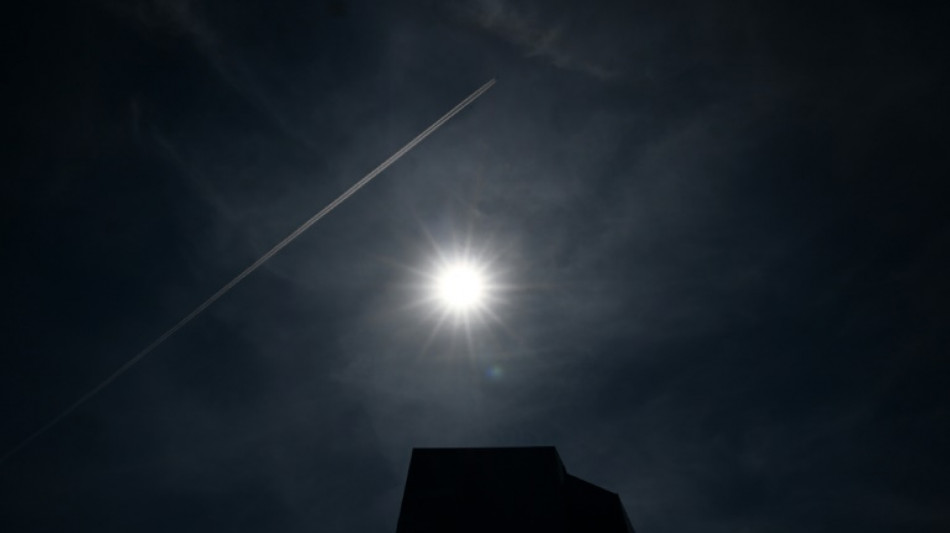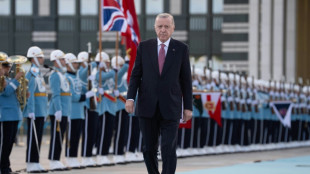
-
 Portugal, Norway book spots at 2026 World Cup
Portugal, Norway book spots at 2026 World Cup
-
Sinner hails 'amazing' ATP Finals triumph over Alcaraz

-
 UK govt defends plan to limit refugee status
UK govt defends plan to limit refugee status
-
Haaland's Norway thump Italy to qualify for first World Cup since 1998

-
 Sweden's Grant captures LPGA Annika title
Sweden's Grant captures LPGA Annika title
-
Tuchel lays down law to Bellingham after England star's frustration

-
 Sinner caps eventful year with ATP Finals triumph over great rival Alcaraz
Sinner caps eventful year with ATP Finals triumph over great rival Alcaraz
-
Portugal book spot at 2026 World Cup as England stay perfect

-
 Hakimi, Osimhen, Salah shortlisted for top African award
Hakimi, Osimhen, Salah shortlisted for top African award
-
Sinner beats great rival Alcaraz to retain ATP Finals title

-
 Schenk wins windy Bermuda Championship for first PGA title
Schenk wins windy Bermuda Championship for first PGA title
-
Crime, immigration dominate as Chile votes for president

-
 Kane double gives England record-setting finish on road to World Cup
Kane double gives England record-setting finish on road to World Cup
-
World champions South Africa add Mbonambi, Mchunu to squad

-
 Greenpeace says French uranium being sent to Russia
Greenpeace says French uranium being sent to Russia
-
'Now You See Me' sequel steals N. American box office win

-
 Argentina beat Scotland after frenzied fightback
Argentina beat Scotland after frenzied fightback
-
Argentina beat Scotland after stunning fightback

-
 Pope urges leaders not to leave poor behind
Pope urges leaders not to leave poor behind
-
Pressure will boost Germany in 'knockout' Slovakia clash, says Nagelsmann

-
 Ecuador votes on hosting foreign bases as Noboa eyes more powers
Ecuador votes on hosting foreign bases as Noboa eyes more powers
-
Portugal qualify for 2026 World Cup by thrashing Armenia

-
 Greece to supply winter gas to war battered Ukraine
Greece to supply winter gas to war battered Ukraine
-
India and Pakistan blind women show spirit of cricket with handshakes

-
 Ukraine signs deal with Greece for winter deliveries of US gas
Ukraine signs deal with Greece for winter deliveries of US gas
-
George glad England backed-up haka response with New Zealand win

-
 McIlroy loses playoff but clinches seventh Race to Dubai title
McIlroy loses playoff but clinches seventh Race to Dubai title
-
Ecuador votes on reforms as Noboa eyes anti-crime ramp-up

-
 Chileans vote in elections dominated by crime, immigration
Chileans vote in elections dominated by crime, immigration
-
Turkey seeks to host next COP as co-presidency plans falter

-
 Bezzecchi claims Valencia MotoGP victory in season-ender
Bezzecchi claims Valencia MotoGP victory in season-ender
-
Wasim leads as Pakistan dismiss Sri Lanka for 211 in third ODI

-
 Serbia avoiding 'confiscation' of Russian shares in oil firm NIS
Serbia avoiding 'confiscation' of Russian shares in oil firm NIS
-
Coach Gambhir questions 'technique and temperament' of Indian batters

-
 Braathen wins Levi slalom for first Brazilian World Cup victory
Braathen wins Levi slalom for first Brazilian World Cup victory
-
Rory McIlroy wins seventh Race to Dubai title

-
 Samsung plans $310 bn investment to power AI expansion
Samsung plans $310 bn investment to power AI expansion
-
Harmer stars as South Africa stun India in low-scoring Test

-
 Mitchell ton steers New Zealand to seven-run win in first Windies ODI
Mitchell ton steers New Zealand to seven-run win in first Windies ODI
-
Harmer stars as South Africa bowl out India for 93 to win Test

-
 China authorities approve arrest of ex-abbot of Shaolin Temple
China authorities approve arrest of ex-abbot of Shaolin Temple
-
Clashes erupt in Mexico City anti-crime protests, injuring 120

-
 India, without Gill, 10-2 at lunch chasing 124 to beat S.Africa
India, without Gill, 10-2 at lunch chasing 124 to beat S.Africa
-
Bavuma fifty makes India chase 124 in first Test

-
 Mitchell ton lifts New Zealand to 269-7 in first Windies ODI
Mitchell ton lifts New Zealand to 269-7 in first Windies ODI
-
Ex-abbot of China's Shaolin Temple arrested for embezzlement

-
 Doncic scores 41 to propel Lakers to NBA win over Bucks
Doncic scores 41 to propel Lakers to NBA win over Bucks
-
Colombia beats New Zealand 2-1 in friendly clash

-
 France's Aymoz wins Skate America men's gold as Tomono falters
France's Aymoz wins Skate America men's gold as Tomono falters
-
Gambling ads target Indonesian Meta users despite ban


Plane contrails: white fluffy contributors to global warming
The white, feathery lines behind airplanes that look like bits of harmless cloud are anything but, warn experts, who say they could have a greater environmental impact than the aviation sector's CO2 emissions.
The condensation trails -- contrails, for short -- are being increasingly studied as scientists work with the industry to find technological solutions to the problem.
Classified as non-CO2 emissions from aircraft, in September they were the subject of a symposium in Montreal organized by the International Civil Aviation Organization, a UN agency.
- What are contrails? -
Contrails are clouds that form at high altitudes in cold, humid areas called ice supersaturated regions (ISSRs).
When jet fuel is burned by engines, water vapor condenses on to soot particles to form ice crystals.
Enough ice crystals, and they begin to form cirrus clouds -- high-altitude, wispy white filaments that, when created this way, trail out behind planes as they cross the sky.
These trails trap some of the heat that rises from the Earth at night, preventing it from radiating back out of the atmosphere -- thus acting as a greenhouse gas, causing warming, explains Donald Wuebbles, a professor at the University of Illinois.
Contrails that stay in the sky for a few minutes are not very worrisome, he says.
"But if they form at night, they'll maybe last a little longer, and at night they can cause a warming effect," he adds.
- What is the impact? -
Non-CO2 emissions could account for up to two-thirds of aviation's impact on global warming, which "gives you an idea of how important they are to consider," Wuebbles said.
And contrails could form up to 57 percent of that impact -- far more than the C02 emissions from burning fuel, according to a 2021 study.
However, such emissions are short-lived compared to carbon dioxide and their impact on global warming could be quickly eroded if solutions were found to avoid them, experts say.
- So what can be done? -
Not all flights create contrails -- it can depend on weather conditions and the aircraft's trajectory.
For example, at Air France, just four percent of flights are responsible for some 80 percent of the airline's contrail impact on global warming, notes Irene Boyer-Souchet, who is leading up the company's efforts to mitigate the damage.
The long-term strategy is to modify the trajectory of a fraction of flights.
Air France pilots made more than 3,000 observations over 18 months with the aim of helping Meteo-France improve its forecasts for at-risk areas so that pilots could eventually avoid them.
"The main risk is that by thinking you're avoiding an area, you could end up flying there because it's slightly off the weather forecast," Boyer-Souchet points out, illustrating the importance of fine-tuning the research.
Pilots from American Airlines conducted 70 test flights above or below at-risk areas, guided by satellite images, weather data, software models and AI prediction tools.
A 54-percent reduction in contrails was observed, along with a two-percent increase in fuel consumption.
Accelerating the deployment of a global contrail avoidance system could reduce aviation's impact on the climate by 40 percent, according to a Cambridge University report published in September.
The more flights in the air, however, the more complicated the implementation of such a system would be, notes Boyer-Souchet, who hopes that it will be a reality by 2030.
I.Yassin--SF-PST




